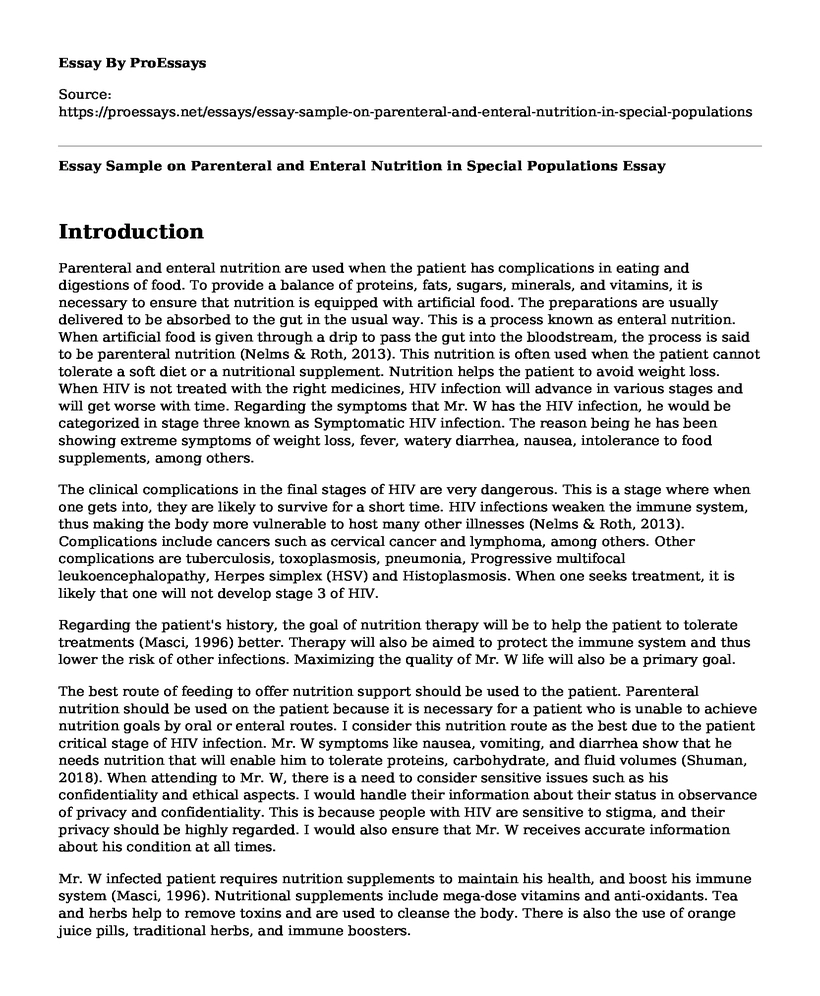Introduction
Parenteral and enteral nutrition are used when the patient has complications in eating and digestions of food. To provide a balance of proteins, fats, sugars, minerals, and vitamins, it is necessary to ensure that nutrition is equipped with artificial food. The preparations are usually delivered to be absorbed to the gut in the usual way. This is a process known as enteral nutrition. When artificial food is given through a drip to pass the gut into the bloodstream, the process is said to be parenteral nutrition (Nelms & Roth, 2013). This nutrition is often used when the patient cannot tolerate a soft diet or a nutritional supplement. Nutrition helps the patient to avoid weight loss. When HIV is not treated with the right medicines, HIV infection will advance in various stages and will get worse with time. Regarding the symptoms that Mr. W has the HIV infection, he would be categorized in stage three known as Symptomatic HIV infection. The reason being he has been showing extreme symptoms of weight loss, fever, watery diarrhea, nausea, intolerance to food supplements, among others.
The clinical complications in the final stages of HIV are very dangerous. This is a stage where when one gets into, they are likely to survive for a short time. HIV infections weaken the immune system, thus making the body more vulnerable to host many other illnesses (Nelms & Roth, 2013). Complications include cancers such as cervical cancer and lymphoma, among others. Other complications are tuberculosis, toxoplasmosis, pneumonia, Progressive multifocal leukoencephalopathy, Herpes simplex (HSV) and Histoplasmosis. When one seeks treatment, it is likely that one will not develop stage 3 of HIV.
Regarding the patient's history, the goal of nutrition therapy will be to help the patient to tolerate treatments (Masci, 1996) better. Therapy will also be aimed to protect the immune system and thus lower the risk of other infections. Maximizing the quality of Mr. W life will also be a primary goal.
The best route of feeding to offer nutrition support should be used to the patient. Parenteral nutrition should be used on the patient because it is necessary for a patient who is unable to achieve nutrition goals by oral or enteral routes. I consider this nutrition route as the best due to the patient critical stage of HIV infection. Mr. W symptoms like nausea, vomiting, and diarrhea show that he needs nutrition that will enable him to tolerate proteins, carbohydrate, and fluid volumes (Shuman, 2018). When attending to Mr. W, there is a need to consider sensitive issues such as his confidentiality and ethical aspects. I would handle their information about their status in observance of privacy and confidentiality. This is because people with HIV are sensitive to stigma, and their privacy should be highly regarded. I would also ensure that Mr. W receives accurate information about his condition at all times.
Mr. W infected patient requires nutrition supplements to maintain his health, and boost his immune system (Masci, 1996). Nutritional supplements include mega-dose vitamins and anti-oxidants. Tea and herbs help to remove toxins and are used to cleanse the body. There is also the use of orange juice pills, traditional herbs, and immune boosters.
Conclusion
All in all, when one is infected with HIV, it is likely that the situation deteriorates with time and requires treatment at the early stages. Mr. W is a victim of HIV infection and needs a special nutrition route. When dealing with him, it is also essential to put into consideration sensitive issues such as privacy and confidentiality. To make sure the body of HIV infected person is immune, it is recommended that they use nutrition supplements which are better than the normal diet.
References
Masci, J. R., (1996). Outpatient Management of HIV Infection. Maryland Heights, MO: Mosby.
Nelms, M., & Roth, S. L., (2013). Medical Nutrition Therapy: A Case Study Approach. Boston, MA: Cengage Learning.
Shuman, E., (2018). Complications of HIV Infection. The Saint-Chopra Guide to Inpatient Medicine, 305-306. doi:10.1093/med/9780190862800.003.0055
Cite this page
Essay Sample on Parenteral and Enteral Nutrition in Special Populations. (2023, Jan 16). Retrieved from https://proessays.net/essays/essay-sample-on-parenteral-and-enteral-nutrition-in-special-populations
If you are the original author of this essay and no longer wish to have it published on the ProEssays website, please click below to request its removal:
- Risk Reduction Strategies Aimed at Preventing Wrong Site Surgery
- How to Implement a Public Health Campaign Essay
- Essay Sample on Benner's Theory of Nursing
- Movie Analysis Essay on "H.O.P.E What You Eat Matters"
- Concept Analysis of Pain - Research Paper
- Essay on Negative Culture Plagues Medical-Surgical Units: Impact on Nurses
- Essay Sample on Lemmel Syndrome: Rare Cause of Obstructive Jaundice







